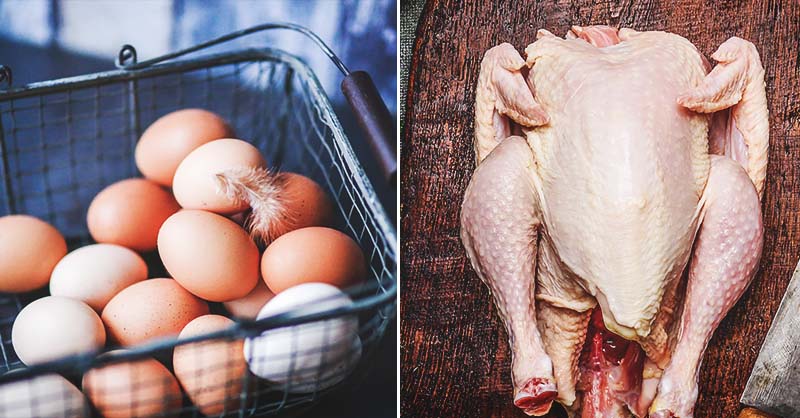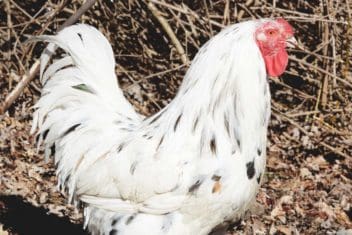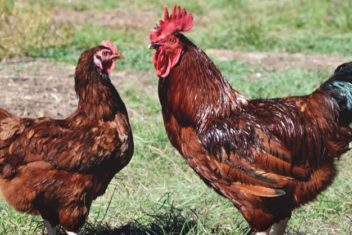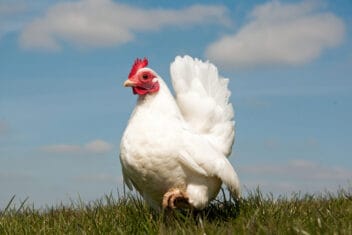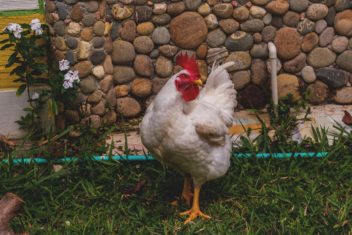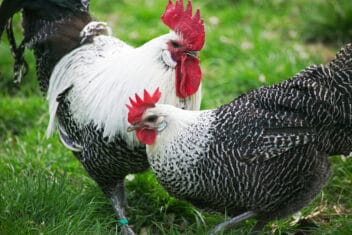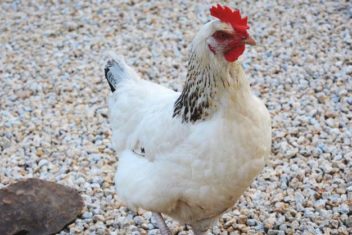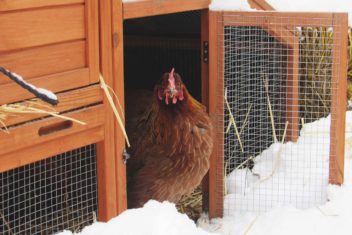As a new chicken owner, you may be all excited to collect eggs from your flock, and you are all set to feed them well so you could enjoy healthy, hormone-free meat in turn.
We take it that you have kept up to date with their health management, carefully considered and constructed adequate housing and am providing the best feed and clean water to keep them healthy and happy.
But now is the time to get the best advantage from their eggs and meat. However, from collecting eggs to butchering them for meat, there is a lot you should know. Before enjoying those nutritious and tasty eggs and meat, it’s best to have ample knowledge even about the nitty-gritty details of the entire process.
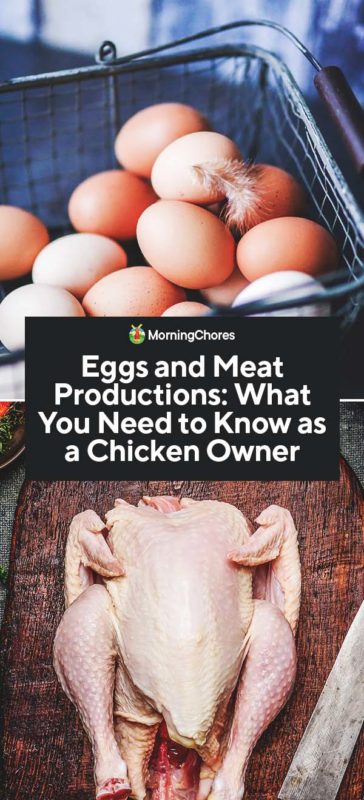
How Many Chickens Should You Get for Eggs?
Though this is one of the most common questions chicken keepers ask, you’ll get a different answer from everyone. That’s because it depends on the following factors:
- The number of people in your family.
- How often they like to have eggs for breakfast.
So, let’s assume you’re a family of six members. All of you are fond of having fresh eggs for breakfast. In this scenario, your backyard chickens should give you six eggs every day.
Let’s do some math: You would like to have 42 eggs per week.
An egg-laying chicken (see the chicken breeds that are ideal for laying eggs) may lay an average of five eggs in a week. This means that you’ll need to buy at least eight chickens to gather a weekly supply of around 40 eggs a week, that are sufficient for your family of six.
However, it’s equally true that raising eight chickens in your backyard can be a tedious task especially if you’re keeping a large number of birds for the first time. Therefore, it’s always better to begin with three chickens, let them grow and lay eggs, and then add more birds to the flock.
While you’re all excited to see dozens of eggs every week, you should also be aware of the seasonality. Chickens regularly lay eggs in the summer. But at the end of the fall season, they lay less. Likewise, in winters, they might lay only a few eggs per week or not lay at all. When spring approaches, your chickens may get back to their regular cycle of laying eggs. And as they step into summer, you can expect the same number of eggs per week.
As time passes and the hens lay eggs according to each season, you’ll gradually get an idea about how the egg-laying timing works and when it’s the right time to introduce additional chickens to your backyard flock.
How Many Chickens Should You Get for Meat?
Getting the correct number of chickens for meat depends on how often you use chickens. You would have to consider lunch meat, roast meat, and chicken meat for other purposes.
If you’re a regular consumer of beef and mutton also, factor that in and calculate how many days you eat chicken.
There are two ways to go about it:
You can raise a flock of about 15 or 20 (the number can vary depending on how many you can raise simultaneously).
You can butcher two to three chickens each week as per your need.
However, this would mean having a large space reserved for coops. Also, replacing two to three chickens weekly for the slaughtered chickens will mean you’re adding chickens to your existing flock. It will bring a host of problems such as fights and diseases.
A more natural way, as done by many people, is to raise the number of chickens they wish to slaughter for six to eight weeks. Then they proceed to butcher them all at the same time. After this, they freeze all the meat. You might need an energy-efficient, spacious freezer. This way, you’ll be spared the hassle of replacing chickens on a constant basis.
Frequently Asked Questions about Chickens for Eggs and Meat
1. When Do Chickens Start Laying Eggs?
Although research indicates that chickens will start laying eggs from 17 weeks onwards, in reality, it can never be truly predicted.
Chickens can lay eggs regularly every day and may take a break for a few days and then start laying every other day. The only thing you can do is to provide them feed with at least 17% protein. It should be whole grain food. Provide them water frequently, and keep the light switched on until you hit the bed.
It’s generally thought that juvenile hens or pullets start laying at the age of six months. Larger chicken breeds like Plymouth Rocks and Wyandottes will take more time while smaller breeds like Australorps can start laying sooner.
However, if your chickens become mature in winter, it’s possible they might not start laying eggs until it is spring. That’s because the amount of daylight also plays a part in egg production.
You must also remember that illnesses can cause a delay in egg production. Parasite infestation such as worms, mites, and lice are a culprit of delayed egg production. To prevent this, keep getting your chickens checked regularly.
2. At What Age Do They Stop Laying Eggs?
We cannot say that they ‘stop’ laying eggs after a certain age. But the egg production does tend to get slower as time passes. Most laying breeds will continue to give you eggs more or less for around five to seven years.
3. What to Do When Your Chicken Stops Laying Eggs?
If your chickens stop laying eggs for the winters, you can extend the daylight by putting a light hooked to a timer in the coop. While this can extend the daylight of chickens, it’s normal for them to stop laying eggs in winter.
If the chickens have stopped laying in winter, you have two approaches in front of you. You can butcher them, and get a nice, chicken stew ready to warm you up in the winter! Or you can give them time until spring to start laying eggs again.
There are more to this, which explained bellow.
4. Do I Need a Rooster?
Hens do not need a rooster for laying eggs. The eggs are infertile without a rooster so they won’t hatch into chicks.
However, if you’re interested in increasing the size of your flock, then you might consider getting one rooster per 6-12 hens.
5. When Can I Butcher?
At commercial farms, they slaughter the chickens at around a year or so because they start laying fewer eggs than before. However, if you’re raising backyard chickens, then one or two fewer eggs should not matter a lot.
However, keeping them just for the sake of an egg or two in a while will not save you much money. Factory farms get hold of chicken food at much lower prices because they buy in bulk. You, on the other hand, might be getting it for around five pounds at a time.
Factory farms also have small space and no nesting boxes while you might be providing quite a lot of amenities to your backyard chickens. While all these points seem to make a case of butchering the chickens when they have slowed egg production, many consider chickens as their pets, not wishing to part with them.
If you’re intent on slaughtering a backyard chicken, then raise the meat chicken breeds as they’re raised exclusively for butchering and can be butchered at around eight months old. Breeds like Plymouth Rock, Wyandotte, and Orpington are raised for both meat and eggs. Their chicks can reach a good size in up to 4 months and can be butchered at the age of eight months.
What to Do When Your Hens Stop Laying Eggs
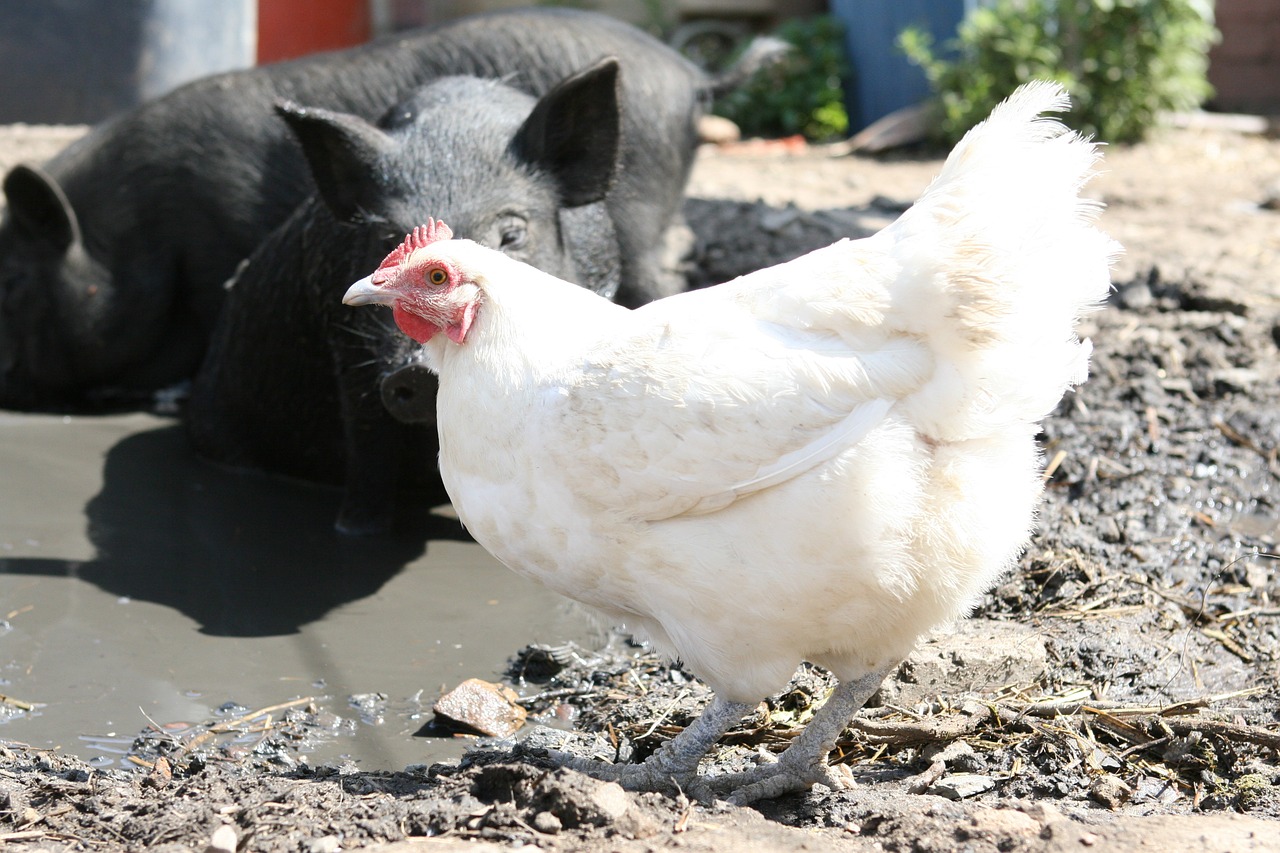
You’ve got the right number of egg-laying chickens. And it’s a pleasure to see those pearly eggs every morning. However, you’ll often come across situations when you open the coop and find out that most of the hens aren’t laying any eggs.
Of course, this may make you think, “What exactly went wrong?”
Even if you’ve been taking care of your birds, there can be many reasons why they’ve stopped laying eggs. Even little things could be responsible for this situation. But worry not! Once you know the exact reason, you can work on the solution easily.
Here are some of the reasons why your chickens have stopped laying eggs and what you’re supposed to do:
1. Your Chicken Breed Is a Meat Bird
Perhaps you know this already from when we discussed chicken breeds that you should buy the egg-laying breeds to get more eggs. But it may be that you mistakenly brought the wrong breed: the broiler! And why would a broiler, a meat chicken, lay eggs?
What you should do
You wouldn’t know which of the chickens isn’t laying eggs unless you separate a few of them and transfer them to another coop. If you don’t see any eggs in any one of the coops, you’ll slowly identify the broiler. Once you know which of those chickens is a broiler, you can separate it from the flock and create an entirely new flock of chickens to raise for meat only.
So, even if you have got only one broiler, you can buy some more to create a flock of meat birds. Feed them well and watch them grow till they get mature enough to be slaughtered and put to your dinner table.
2. Your Chicken Has Exceeded Her Egg-Laying Age
If you’re raising a few chickens in your backyard instead of keeping a flock of more than 10-12 hens, then it’s natural that you know each one of them – including their egg-laying habits! And suddenly, you notice that one of them has completely stopped laying eggs. Her age can be the reason. Chickens older than eight years stop laying eggs.
What you should do
An old chicken will not lay any more eggs. You can either keep your chicken as a pet until it dies naturally or donate it as a gift to a friend or neighbor who loves to keep chickens without the purpose of getting eggs from it.
3. The Daylight Hours Decreased
Hens lay a lot in summer because of ample daylight. But as the winter approaches, the daylight hours decrease. Because the sun doesn’t rise in winter as early as in summer, the chickens also wouldn’t bother to get up from their roosts in winters until they see daylight. Also, as the sun sets early in winter, they’ll fall asleep earlier as compared to their summer routine.
So, if chickens don’t lay eggs in winter, it’s mainly because they have got limited time to stay awake and prepare their bodies for laying eggs.
What you should do
You’ll often face this situation if you live in a cold country. But here’s the solution: it’s quite easy to trick the backyard chickens by artificially increasing daylight. Insert a light bulb or a lamp in the coop. Just before it gets dark, switch it on. This way, the chickens would think that it’s still daylight and they can still lay eggs. The light will also keep them awake.
4. Your Chickens are Stressed Out
Surprisingly, chickens and humans have two things common among them: stress and its consequences.
When we’re stressed out, it affects our health as well as productivity. Chickens share similar traits! When stress is disturbing them, they’ll be less healthy and will stop producing eggs. There may be numerous reasons behind this phenomenon. Perhaps, your chickens were attacked by a predator. Or it may be that they hate getting chased by kids.
Another reason is that you’ve just purchased a few grown-up chickens that used to lay eggs in their previous home. But as they’ve entered your backyard for the first time, they’re having adjustment problems.
What you should do
Undoubtedly, they deserve protection. Make sure they’re safe from all predators. If you have kids at home, teach them how sensitive these birds are and how important it is to be kind to backyard chickens.
If your chickens are new to your backyard, give them some time to settle in, as well as love and care. Over time, they’ll get used to the new place and will start laying eggs again.
5. Your Chicken Isn’t a Prolific Layer
It may sound a bit disheartening, but some chickens are fantastic at producing eggs while others get by producing low quantities of eggs. The number of eggs laid by your chicken varies from breed to breed, and this can be one reason why your hen is not into it!
Some of the breeds which are known for being prolific egg layers are White Leghorns, Sexlinks, and Road Island Reds. Other breeds like Jersey Giant and Dominiques are not particularly known for egg laying.
What you should do
You can do your research to find out how many eggs your breed of chickens lays usually. If you own a Rhode Island Red, but it’s laying fewer eggs than expected, then it may be that it’s encountering some problem.
If you have some other breed, say, Jersey Giant, and it’s not showing any other problematic symptoms, then, perhaps, it’s simply not laying eggs because of its breed. Although Jersey Giant is a great alternative to have both eggs and meat, it doesn’t produce as many eggs as compared to other chicken breeds.
6. Your Chicken’s Diet Is Low on Protein
Some dietary requirements of chickens are the same as ours. They need proper nutrition for proper functioning.
Chickens need a fair amount of protein and if you notice the egg supply dwindling to a stop, make sure that protein deficiency isn’t the reason behind it. If it is, you can fix that.
What you should do
A healthy amount of protein should be provided to chickens via layer pellets. However, if you still don’t see any noticeable difference in egg production, then you can try giving treats with high protein content such as mealworms or pumpkin seeds.
Other than this, chickens also need water and grit. Grit is needed by chickens to help them process their food.
Chickens also need an abundant supply of fresh water, and they love gulping water. If your chickens are happy with the fancy waterers, you can keep them around. Another option is to go for a 2.5-gallon bucket with fresh water. This one also makes for happy chickens as they can gulp water.
7. You Introduced Some New Members to the Flock
Can it be that you introduced some new chickens to the flock? Or perhaps, you have finally completed their grand chicken coop and moved them to the new place. Both of these factors can have an impact on their egg laying.
Sometimes, when your flock has new chickens, the older ones can halt laying eggs. It just ‘shocks’ the chicken out of their natural rhythm. The chickens have to determine the space and place (pecking order) for new members. While it does take time for chickens to settle in, they do eventually start laying eggs when things become normal for them.
The same thing happens when you move chickens to a new place. Chickens follow a routine and moving them to a new place, even if it’s a coop across the backyard, can throw things off-balance for them making them stop egg production for a few days.
What you should do
Have patience as your chickens will come around. They just need a few days in order to adjust and establish the new pecking order.
In case it’s a new neighborhood for them, they would again require a few days. Once they’re familiar with the surroundings, they’ll lay eggs as usual.
8. Chickens Like Looking at Food
Just like you like getting up in the middle of the night and hovering around the fridge to see what’s inside, chickens do too (minus the fridge part!)
Even though you may not necessarily eat something from the fridge, just looking at it reassures you that it’s stocked to the brim and you don’t need to worry about anything. Chickens think the same way. They need to know that they have enough supplies of food. Otherwise, they can start thinking that they’re about to starve.
If they are not adequately fed or do not see food available, they can reroute their nutrients in their body. The nutrients are now used to keep them alive, instead of being used to lay eggs.
What you should do
It’s as simple as leaving a good quantity of food in the chicken coop. It doesn’t matter if they don’t eat it all. It just serves as a reminder that there is plenty of food available and they don’t need to worry about the shortage of food.
If you have an automatic feeder, you can try refilling it when it has about a quarter of the food left.
9. Their Coop Is Dirty, and They Hate It!
As an owner of backyard chickens, you know it can get messy in the coop. You have to clean the animals’ area regularly and frequently. If the nesting place of the chickens is not clean, they won’t lay eggs there.
Anyone who has raised chickens knows full well that chickens do poop in their nesting area too. However, it doesn’t mean that you start cleaning and throwing away the whole nesting material in the trash every single day. That would be very hectic, right?
Thankfully, there is an easier solution.
What you should do
You should clean empty the chickens’ nesting boxes weekly or twice a week. The nesting box should be refilled with nice, clean, and good-quality nesting material. From wood shaving and straw to pine shavings and shredded paper, all of these materials make for comfy nesting boxes.
Pine shavings are a favorite of some people as they keep the smells at bay and also keep the nest looking neat.
Also, stick to a set cleaning schedule. On a scheduled day, you can go and clean all the animals’ areas.
10. The Chickens Need Space
If you thought humans only need personal space, then no, chickens need it too! They don’t require a big, roomy area. But yes, some space is still required. If your chickens’ coop is crowded, they won’t lay eggs.
The space needed by chickens depends on whether it’s free-range or cooped.
For free range chickens, you only need about three to four square feet per chicken. Most of their day will be spent outside so the chickens will come in the coop merely for sleeping.
If, however, your birds are cooped up most of the time, you’ll need to arrange about 10 square feet of space for each chicken. That could be 3 square feet of shelter plus 7 square feet of run (or 4 & 6).
What you should do
You should build a coop offering enough space for the chickens. Another alternative is to reduce the number of chickens you’re currently keeping. With a spacious coop, the chickens will be well-settled and happy. Hence, they’ll be good egg layers too.
11. Your Chicken Is Ill
One of the reasons chickens can stop laying eggs is that they’re ill. If your chicken has stopped laying eggs, it may be time to call a vet. Usually, chickens don’t show any signs of illnesses which makes this process all the more difficult for chicken owners.
However, if you see some symptoms, call in a vet immediately. An alarming disease can be bird flu which spreads at a disturbing rate from bird to humans. If you suspect that your chicken has it, there’s no reason to delay. You should call the vet.
You’ll also need to call in your county agent to test the chickens and notify the proper authorities to inform them about the case in the county.
Many times, chickens also catch a respiratory disease which can be terrible in themselves and can wipe out a large flock.
If you notice any chickens having a runny nose, quarantine the chicken as soon as possible. Many would suggest you kill the chicken if it catches a respiratory disease. But once they recover from the disease, chickens can get back to the egg laying business.
What you should do
Get medical treatment. You can also try some natural ways for treating respiratory problems in the chicken. If it’s a regular virus rather than the dreaded bird flu, you can offer them some super food to eat, feed them fresh herbs, and put ACV (apple cider vinegar) in their water.
Once the chickens heal, they can get back to laying eggs. However, be mindful that many times illness coincides with the molting process. Therefore, you would have to pay close attention to the chickens to rule out the possibility of molting during the early months of winter.
Collecting, Cleaning, and Storing Eggs
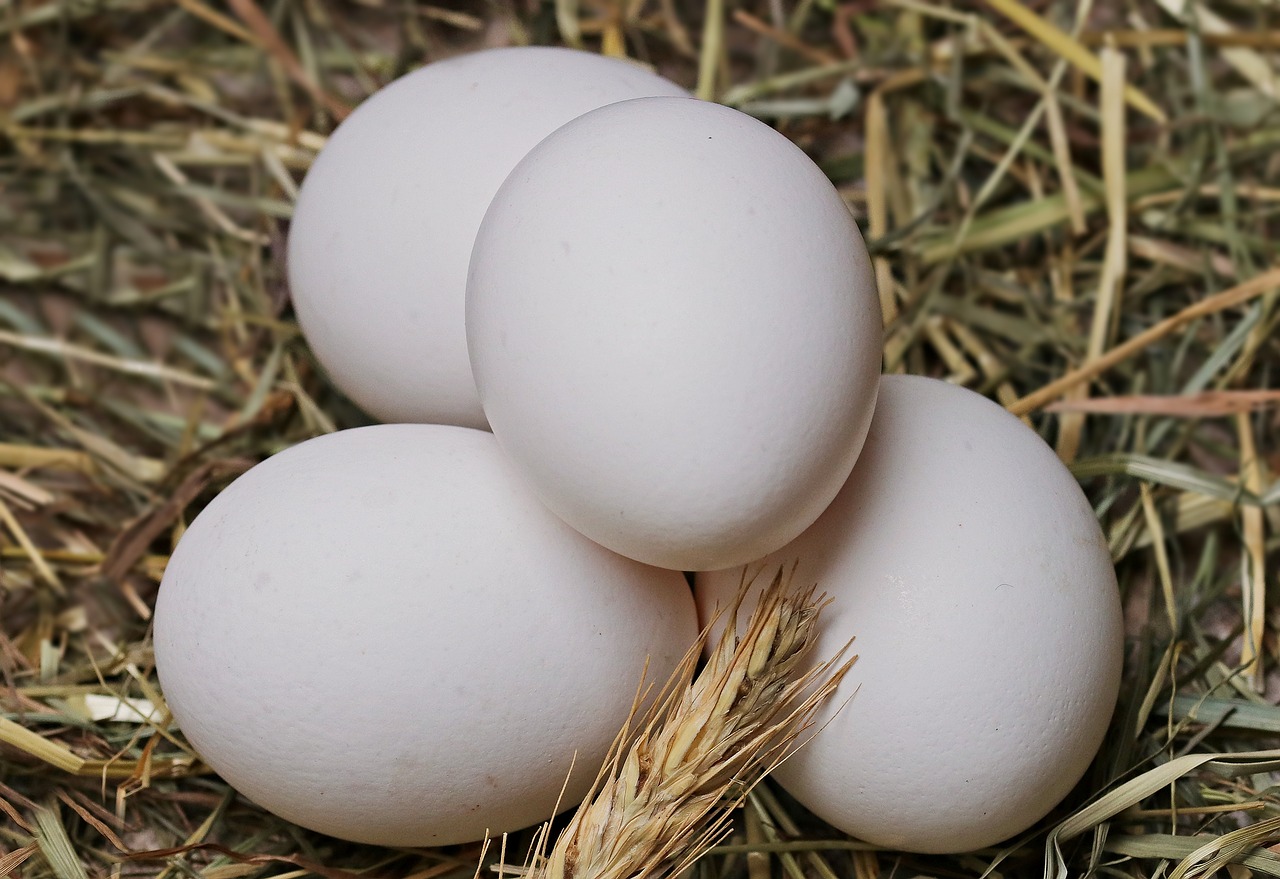
It’s undoubtedly a cheerful morning when you visit your backyard and see those fresh, beautiful eggs – the best sight ever! But don’t think that you’ve achieved it all. Once you collect the eggs, there are a few tasks you must carry out to ensure maximum hygiene.
1. It’s Time to Clean the Eggs
Before doing anything else with the eggs, you need to clean the eggs.
Cleaning the egg depends on various factors too. If you’re keeping the eggs for yourself and it doesn’t matter if the eggs are a bit grimy, you can store them as they are.
However, if you’re gifting them to some relative or friends, you might want to wash the eggs. Of course, who would like to accept dirty eggs as a gift? To keep the eggs nice and clean, you can ensure that the hens have freshly laid straw on which they can lay their eggs. This will make sure that the eggs are clean from the start.
You don’t need to replace straw every day. Just be mindful of picking up any large gathering of muck from the area once you have started collecting eggs.
Undoubtedly, there will always be one time or the other when you’ll find an egg piled with muck.
In that case, first, try to wipe it off with a dry-cleaning pad. If the egg is pretty messy and it won’t be possible for you to clean it with the pad, run it under warm water and remove muck with the help of the cleaning pad.
Running the water should be done as a last resort, after first attempting to clean the egg with a cleaning pad. This is so because when you run water over the egg, you remove the egg’s bloom, which is a natural protective layer, shielding it from bacteria.
Once cleaned, eggs can be stored in multiple ways, some of which are given below.
2a. Store the Eggs at Room Temperature
Eggs can be stored at room temperature for around a month before you can start thinking of moving them to the refrigerator. Even so, the eggs would taste better in their first two weeks.
You can store them in a dish or basket filled with straw (for a natural alternative) or you can even go the egg carton way.
Also, remember that while storing, the temperature shouldn’t exceed 55°F otherwise it will be harmful. Also, the humidity should be around 75%. If it’s too dry, the eggs will dry out. However, if the humidity level is too high, the eggs will get moldy. So, you have to strike a balance.
2b. Store the Eggs in a Fridge
Storing eggs in a refrigerator is another way to preserve eggs. Since it does extend their shelf life, you can enjoy them for a much longer time after getting hold of them.
Again, you may opt for anything ranging from an egg carton to any sealed container. In a fridge, eggs can last for as long as six months. However, the egg white might become a little runny.
To have the best of eggs, mark the dates on which eggs were laid. This can help you keep track if you’re concerned about the safety and freshness of the eggs.
How to Store Fertile Chicken Eggs
If you’re thinking of storing fertile chicken eggs for a while before you start incubating them, here are a few things you might want to go through:
A chicken lays eggs in a clean area. You should duplicate the same process. Otherwise, there is a high chance or risk of contaminating the eggs.
To avoid a contamination problem, set the fertile eggs in cardboard cartons but ensure that they’re new. Don’t use them for more than one batch. If you’re using resin or plastic storage containers for multiple times, you can do so after thoroughly washing them. You can clean it with sterilizing liquid or even mild bleach solution be made by dissolving about a teaspoon of bleach to a liter of water.
If you’re looking for an ideal solution, you can always go for a plastic refrigerator storage organizer. It can be used not just in a pre-incubation period but can also be used for storing eggs in the fridge for eating.
Another thing to remember about storing fertile eggs is to keep them the ‘right way up’ which would be mean keeping the pointed end downwards. If you end up putting the more rounded end facing upwards, there is a risk of the air cell becoming dislodged, making the embryo inside die!
In a natural setting, a hen keeps rotating the eggs before incubation, since it knows by instinct that keeping it on just one side will make the embryo stick to the membrane in the egg. You too should rotate the eggs on a regular basis before incubation. Turn them twice daily.
Lastly, keep the eggs cool and dry to maintain their fertility.
How to Butcher Your Backyard Chickens
If you’re a first-timer, this would be one of the sad times of your life – butchering your backyard chickens. But remember, you’ve been doing all this hard work to get healthy meat. And now is the time to get that meat.
Here’s how you’ll do it in the most humanely way:
- Catch the chicken and place it in the killing cone with head first. This brings the wings together and doesn’t let the bird flap its wings wildly after death.
- Get a sharp knife and slice through the jugular veins, windpipe, and food tract. Cutting through the jugular allows the blood to drain and as soon as it does, the chicken dies.
- Let the chicken hang for some time. Later, cut its head off. Once again, let it remain hanging until all of its blood has drained out.
- Now, you can start de-feathering the chicken. You can also plunge the chicken carcass in boiling hot water for up to a minute. It helps with easy de-feathering.
- You could get hold of a plucker that gets rid of the feathers for you quickly.
- Cleaning the chickens requires you to cut its feet off at the joint.
- Make a slit on the skin starting from the backbone to the end of the neck.
- Get rid of the skin by grasping the chicken’s neck and pulling the skin down tightly.
- Cut and pull the windpipe and crop from the bird and discard.
- Now, make a slit in the body cavity and remove the vent. Remove the insides. Pull off the bile duct while taking the liver. However, do not break it or your bird will be stained green.
- Also, remove the lungs. You can use a lung scraper tool which is pretty helpful in doing the task and is a good one-time investment.
- Take the gizzard, peel, and clean it.
- Scrape the inside cavity of the chicken for any leftovers.
- You can remove the glands by making a slit in the tail and cutting them off. The yellow glands make a chicken taste bad and hence you might want to get rid of them.
- Now, the bird is ready for trimming and cleaning before you start cutting it up into different pieces.
This video below will show you how to do it humanely using a killing cone.
Note: This is an age-restricted video based on Community Guidelines.
Click on this link to go to YouTube where your age will be asked.
How to Store Slaughtered Chicken
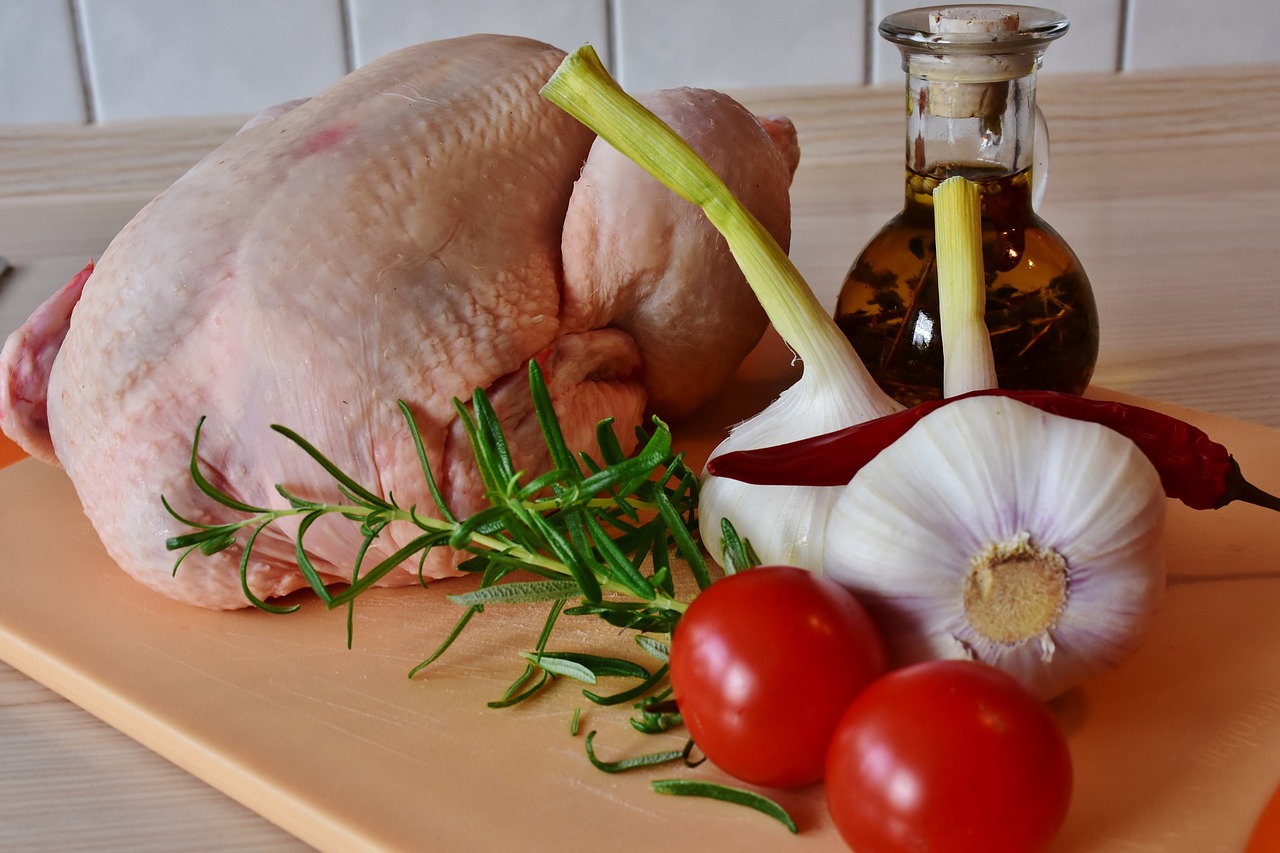
After the butchering part, you can get the chickens all nicely sealed and packaged, ready to go in the freezer, for a long vacation!
After cleaning/washing the carcasses, lay them on a cooling rack for draining. Now, measure them on a digital scale.
You can use a vacuum sealer that sucks all the air out of the bag. Once you have used it, tightly shut the chicken in the sealed plastic bag.
As per your liking, you can store the chicken in one bag or store it in different pieces. Mostly, people cut and package separate bags of legs, thighs, breasts, and wings. It makes the job easier, and you can pull out the necessary bags you need for any particular chicken dish you want to concoct later!
While the other parts can be used for roasting, grilling, etc., the necks and backs of the chicken can be utilized for a steamy chicken stock.
Conclusion
What joy to be finally able to enjoy the produce of your hard labors. You have taken the big decision to have a few chickens in your backyard, built a coop, bought the right breed, read up on watering and feeding, and now at long last, you can enjoy fresh eggs every day, and quality chicken meat!
At this point, your neighbors will value the knowledge and expertise you have applied to care for your flock, and may soon be copying you with keeping a few hens too.
